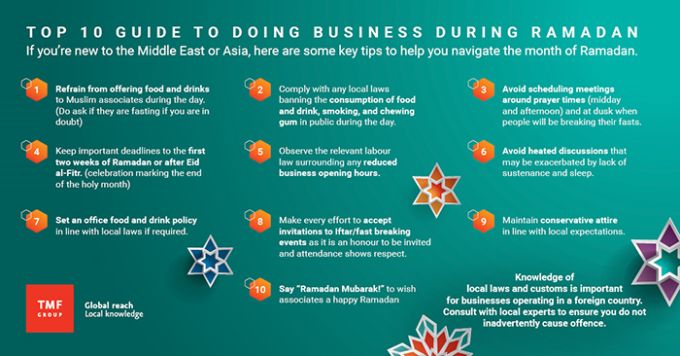The Middle East
A reduction in business opening hours is probably the most notable change in the Middle East during Ramadan. The work day is shortened by two hours by government stipulation for both Muslim and non-Muslim workers in Qatar and the UAE.
Government and Authority offices including banks will usually work different hours (largely mornings) compared to private companies and some offices will specify evening opening so it is always worth checking in advance.
Muslims spend a large part of their days over the holy month in contemplation and prayer. They dedicate themselves to their religion and focus on developing a better understanding of the Qu'ran and religious practise.
The greater focus on faith coupled with fasting, particularly now where the Holy month falls in the summer, can result in a slowdown for companies as some impact on productivity is to be expected.
Many signatories and business heads in the Middle East will choose to travel during Ramadan but it is a great time for firms to shift their focus to building strong relationships with contacts in the region, as it is one of the keys to local business success.
Food and beverages
Over the coming month, food and beverage outlets (aside from those in big hotels) will be closed during the day and business lunch and dinner events should of course not take place - as it is illegal to eat, drink, smoke or chew gum in public until sundown.
By law in the Middle East, even the inside of your car or office is considered a "public place" and therefore off limits for food and drink.
However if you are working in a mixed nationality office there may be exceptions. It is important to be discreet when eating or drinking at work and if possible, always go to a private or closed room. This would extend to birthday celebrations or office events; it is considered inappropriate to bring cake or other food items into the office in full view of those who might be fasting.
Iftars
While no business dinners should take place, Iftar (dusk) or Suhoor (three hours after Iftar and later) events are often arranged by companies. Business Iftars are normally scheduled for the third or fourth week of Ramadan as the first couple of weeks are dedicated to breaking the fast with family.
It is common for Muslim associates to extend invitations to attend Iftars with their family and friends. These invitations are a sign of trust and friendship, and acceptance is advised. In line with Ramadan being a period for reflection and prayer there is a ban on all live music and entertainment in some parts of the Middle East. It is also considered offensive to play music loudly in your car or home, or so that others can hear it.
Attire
More conservative attire should be worn by both men and women when interacting with Muslim colleagues or clients. Ensure you are covering the shoulders and legs; this is enforced by local laws.
Traffic can be particularly bad in the period before Iftar when many people will be rushing to get home to break their fast and so it is advisable not to schedule meetings at this time. The lack of sustenance and extreme heat can lead to lack of concentration on the roads, and an increased number of accidents.
Of course Muslims are celebrating Ramadan all over the world at this time, but there are some Asia Pacific countries in which TMF Group operates, where change to business practise is also common.

Malaysia, Labuan and Singapore
Working hours during Ramadan remain the same for all sectors in Singapore, Malaysia and Labuan, however the Muslim workforce will skip lunch and leave work one hour earlier to break their fast. Depending on whether you are located in East or West Malaysia, fast-breaking occurs between 6 and 8pm.
Where companies have a majority Muslim workforce, business lunches are generally avoided. Non-Muslim guests will still be offered refreshments during meetings however it is advised they decline these if possible, in order to show respect.
No meetings should be scheduled in the evenings during Ramadan, but fast-breaking dinner celebrations can be held by companies.
Indonesia
During Ramadan, there are specified hours of work and break times for Indonesian government agencies that enforce five and six working days respectively, while total working hours for local and central government institutions are capped at 32.5 per week.
Banks will normally close one hour earlier, and private sector working hours are also reduced by one hour over the Holy month.
It is otherwise business as usual during Ramadan in Indonesia, however basic courtesies should be extended, such as asking if Muslim clients and colleagues are fasting before offering food and beverages, and avoiding holding big lunch meetings.
Just like in the Middle East, it is a privilege (and a great networking opportunity) to attend fast breaking events in the Asia Pacific region during Ramadan, and one should endeavour to accept invitations.
Article contributors: Stephanie Williams, Celine Chan, Wai Bing Yap and Vinod Kumar.
The content of this article is intended to provide a general guide to the subject matter. Specialist advice should be sought about your specific circumstances.

